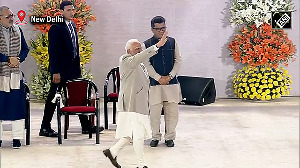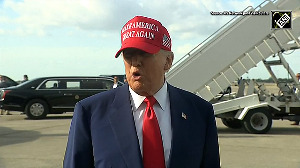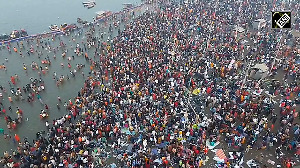But today, like many other patriotic Indians, I remain indoors. No doubt, we have high definition television sets, not just to bring those scenes home, but also to proclaim the rapid strides the country has made since those difficult days when black and white television could not recreate in our living rooms the riot of colours that every Indian celebration generates. But the empty seats in the VIP rows, the thin crowds and the prime minister's pointed reference to terrorism from behind his bullet proof enclosure told its own tale about my beloved nation.
Asked about the phenomenon of terrorism, a veteran journalist made the observation that India never had total peace in the country at any time after independence. Perhaps, if we read all the speeches from the ramparts of the Red Fort, we would see there was some crisis or the other that every prime minister was compelled to talk about.
There were also wars to discuss. Prices of essential goods and need for conservation were recurring themes. Every promise was laced by the need for hard work, unity and dedication. Was there ever a speech without implicit or explicit reference to Jammu and Kashmir or the threat from Pakistan and China?
Any exercise in stock taking and futurology must necessarily involve a reality check. But this year, the threat was real against the background of the Bangalore and Ahmedabad bombings and the increasing uncertainties across the border in Pakistan. Amarnath was added to the list of hotspots.
Inevitably, the nuclear deal is very much in the minds of people though many are as yet uncertain about the alphabet soup of IAEA, NSG, NPT and CTBT being bandied about. Does this Independence Day mark the end of independence in our foreign policy?
I asked three veteran diplomats, one of them with sympathy for the BJP, on record. The answer was 'no' but with the caveat that no country is ever fully independent in foreign policy. Only Uganda under Idi Amin and North Korea under Kim Il Sung (not under his son) were fully independent, he said.
He was underlining the interdependence of nations, but no policy maker would have given this argument five years ago. He would have said that India acted independently even if the action was supportive of one power or the other. I asked why India had not yet made any comment on the Russian military action in Georgia and the three of them said that it was not necessary for India to make comments on everything! I mentioned Hungary, but no one wanted to hear about history.
The prime minister spoke about the deal as necessary for the country's energy needs. But it was Amartya Sen, who reflected the prime minister's true feelings of disappointment with the left. Amartya Sen said something more important in his speech to the Parliamentarians.
We should not exaggerate the capacity of the Americans to harm us, he said. He was obviously referring to the fact that it is a nation in search of friends, homeland security and non-proliferation. It needs India today as much as India needs it.
Just as the certification requirements under the Pressler Amendment were ignored in the case of Pakistan, the same under the Hyde Act would be ignored as long as this complementarity exists. That is indeed the guarantee against the unfortunate provisions of the Hyde Act, not the legal wrangle about its applicability or otherwise. Speaking of the Hyde act, no one wants to remember that our embassy in Washington had mobilised support for the Hyde Act, which has now become a bone of contention.
Even as we and Pakistan were celebrating independence, shots were heard across the Line of Control, which reverberated across the world. There were also reports about the continuing power struggle in Pakistan itself. The national security adviser said the possible removal of Musharraf would result in resurgence of terrorism. He also announced that there were hundreds of terrorist outfits in India itself and the mastermind was inside the country. These are not glad tidings for India on its birthday.
Of course, the glad tidings about Abhinav Bindra's Olympic Gold electrified the nation and gave this year's Independence Day a brilliant touch. He became a hero overnight and there was expectation that he may be given a place of honour at the Red Fort.
But the prime minister did not even mention this historic achievement in his speech. I can well imagine the debate within the inner circle of the prime minister. The thought might have prevailed that raising it to the level of the Independence Day address would create a bad precedent. After all, even Viswanathan Anand was not given any such recognition.
Moreover, the shooting gold was a flash in the pan when the rest of the team did not cover itself with glory. India has decided to take this remarkable victory in its stride rather than flash it as a crowning glory. Perhaps, there was also a thought that, given the special opportunities that Abhinav had in terms of equipment and training, far beyond the reach of other sportsmen, set him apart from the others. His victory looked like the triumph of a determined and heroic individual, a phenomenon which could not be replicated. But for a country, which is hungry for good news, a reference to Abhinav may have come as a welcome relief.
The welcome relief indeed came to the officialdom in the announcement of the implementation of the Pay Commission recommendations, with further improvements by the government. The entire nation will also welcome the much awaited enhancement of the pay and perks of the armed forces.
But the question is whether this will lead to elimination of corruption and lethargy in the bureaucracy. Not likely, because we will hear soon that the gap between the salaries of the senior bureaucrats and the dot com community is still huge. Inflation will be the other excuse for them to continue in their old ways.
The most dominant thought in Delhi on Independence Day is none of these. It is the impending elections. Only when Parliament meets will the world know what the recent change in power equations will mean in terms of policy.
The government may well find that the present configuration may be more difficult to manage than the older one. And if the elections are held, no one knows what the results will be.
It is frightening to think that the time ahead will be used by many to entrench their economic, social and political agenda. And that is a sobering thought on this Independence Day.
T P Sreenivasan, a former member of the Indian Foreign Service, was India's ambassador to the United Nations, Vienna, and governor for India, International Atomic Energy Agency.






 © 2025
© 2025